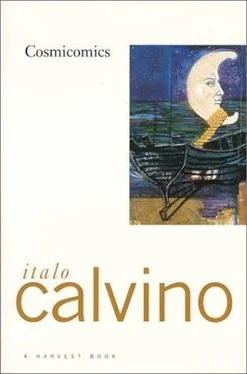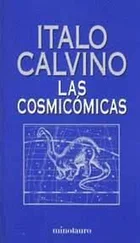
Italo Calvino
Cosmicomics
Translated from Italian by William Weaver
First published in 1965
Translation first published in 1968
At one time, according to Sir George H. Darwin, the Moon was very close to the Earth. Then the tides gradually pushed her far away: the tides that the Moon herself causes in the Earth's waters, where the Earth slowly loses energy.
How well I know! – old Qfwfq cried, - the rest of you can't remember, but I can. We had her on top of us all the time, that enormous Moon: when she was full – nights as bright as day, but with a butter-colored light – it looked as if she were going to crush us; when she was new, she rolled around the sky like a black umbrella blown by the wind; and when she was waxing, she came forward with her horns so low she seemed about to stick into the peak of a promontory and get caught there. But the whole business of the Moon's phases worked in a different way then: because the distances from the Sun were different, and the orbits, and the angle of something or other, I forget what; as for eclipses, with Earth and Moon stuck together the way they were, why, we had eclipses every minute: naturally, those two big monsters managed to put each other in the shade constantly, first one, then the other.
Orbit? Oh, elliptical, of course: for a while it would huddle against us and then it would take flight for a while. The tides, when the Moon swung closer, rose so high nobody could hold them back. There were nights when the Moon was full and very, very low, and the tide was so high that the Moon missed a ducking in the sea by a hair's-breadth; well, let's say a few yards anyway. Climb up on the Moon? Of course we did. All you had to do was row out to it in a boat and, when you were underneath, prop a ladder against her and scramble up.
The spot where the Moon was lowest, as she went by, was off the Zinc Cliffs. We used to go out with those little rowboats they had in those days, round and flat, made of cork. They held quite a few of us: me, Captain Vhd Vhd, his wife, my deaf cousin, and sometimes little Xlthlx – she was twelve or so at that time. On those nights the water was very calm, so silvery it looked like mercury, and the fish in it, violet-colored, unable to resist the Moon's attraction, rose to the surface, all of them, and so did the octopuses and the saffron medusas. There was always a flight of tiny creatures – little crabs, squid, and even some weeds, light and filmy, and coral plants – that broke from the sea and ended up on the Moon, hanging down from that lime-white ceiling, or else they stayed in midair, a phosphorescent swarm we had to drive off, waving banana leaves at them.
This is how we did the job: in the boat we had a ladder: one of us held it, another climbed to the top, and a third, at the oars, rowed until we were right under the Moon; that's why there had to be so many of us (I only mentioned the main ones). The man at the top of the ladder, as the boat approached the Moon, would become scared and start shouting: "Stop! Stop! I'm going to bang my head!" That was the impression you had, seeing her on top of you, immense, and all rough with sharp spikes and jagged, saw-tooth edges. It may be different now, but then the Moon, or rather the bottom, the underbelly of the Moon, the part that passed closest to the Earth and almost scraped it, was covered with a crust of sharp scales. It had come to resemble the belly of a fish, and the smell too, as I recall, if not downright fishy, was faintly similar, like smoked salmon.
In reality, from the top of the ladder, standing erect on the last rung, you could just touch the Moon if you held your arms up. We had taken the measurements carefully (we didn't yet suspect that she was moving away from us); the only thing you had to be very careful about was where you put your hands. I always chose a scale that seemed fast (we climbed up in groups of five or six at a time), then I would cling first with one hand, then with both, and immediately I would feel ladder and boat drifting away from below me, and the motion of the Moon would tear me from the Earth's attraction. Yes, the Moon was so strong that she pulled you up; you realized this the moment you passed from one to the other: you had to swing up abruptly, with a kind of somersault, grabbing the scales, throwing your legs over your head, until your feet were on the Moon's surface. Seen from the Earth, you looked as if you were hanging there with your head down, but for you, it was the normal position, and the only odd thing was that when you raised your eyes you saw the sea above you, glistening, with the boat and the others upside down, hanging like a bunch of grapes from the vine.
My cousin, the Deaf One, showed a special talent for making those leaps. His clumsy hands, as soon as they touched the lunar surface (he was always the first to jump up from the ladder), suddenly became deft and sensitive. They found immediately the spot where he could hoist himself up; in fact just the pressure of his palms seemed enough to make him stick to the satellite's crust. Once I even thought I saw the Moon come toward him, as he held out his hands.
He was just as dextrous in coming back down to Earth, an operation still more difficult. For us, it consisted in jumping, as high as we could, our arms upraised (seen from the Moon, that is, because seen from the Earth it looked more like a dive, or like swimming downwards, arms at our sides), like jumping up from the Earth in other words, only now we were without the ladder, because there was nothing to prop it against on the Moon. But instead of jumping with his arms out, my cousin bent toward the Moon's surface, his head down as if for a somersault, then made a leap, pushing with his hands. From the boat we watched him, erect in the air as if he were supporting the Moon's enormous ball and were tossing it, striking it with his palms; then, when his legs came within reach, we managed to grab his ankles and pull him down on board.
Now, you will ask me what in the world we went up on the Moon for; I'll explain it to you. We went to collect the milk, with a big spoon and a bucket. Moon-milk was very thick, like a kind of cream cheese. It formed in the crevices between one scale and the next, through the fermentation of various bodies and substances of terrestrial origin which had flown up from the prairies and forests and lakes, as the Moon sailed over them. It was composed chiefly of vegetal juices, tadpoles, bitumen, lentils, honey, starch crystals, sturgeon eggs, molds, pollens, gelatinous matter, worms, resins, pepper, mineral salts, combustion residue. You had only to dip the spoon under the scales that covered the Moon's scabby terrain, and you brought it out filled with that precious muck. Not in the pure state, obviously; there was a lot of refuse. In the fermentation (which took place as the Moon passed over the expanses of hot air above the deserts) not all the bodies melted; some remained stuck in it: fingernails and cartilage, bolts, sea horses, nuts and peduncles, shards of crockery, fishhooks, at times even a comb. So this paste, after it was collected, had to be refined, filtered. But that wasn't the difficulty: the hard part was transporting it down to the Earth. This is how we did it: we hurled each spoonful into the air with both hands, using the spoon as a catapult. The cheese flew, and if we had thrown it hard enough, it stuck to the ceiling, I mean the surface of the sea. Once there, it floated, and it was easy enough to pull it into the boat. In this operation, too, my deaf cousin displayed a special gift; he had strength and a good aim; with a single, sharp throw, he could send the cheese straight into a bucket we held up to him from the boat. As for me, I occasionally misfired; the contents of the spoon would fail to overcome the Moon's attraction and they would fall back into my eye.
Читать дальше













